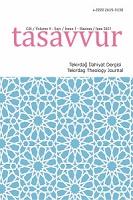Teolojide İlişkisellik: Jürgen Moltmann’ın Ekoteolojik Antropolojisinden Hareketle Bir Değerlendirme
Relationality in Theology: A Study in the Context of Jürgen Moltmann’s Theological Anthropology
Author(s): Sevcan ÖztürkSubject(s): Anthropology, Theology and Religion, Philosophy of Religion
Published by: Tekirdağ Namık Kemal Üniversitesi İlahiyat Fakültesi
Keywords: Philosophy of religion; ecotheology; Jürgen Moltmann; relationality; theological anthropology; imago Dei;
Summary/Abstract: This study deals with the concept of relationality, which has become one of the central themes of contemporary theological literature. The value of the concept in terms of philosophy of religion and related disciplines such as ecotheology and comparative theology is questioned within the framework of Jürgen Moltmann’s ecotheological anthropology. This study claims that the applications of relationality in theology have the potential to make significant contributions to the enrichment and deepening of the perspectives of the philosophy of religion and related disciplines and that especially philosophy of religion can make conceptual and methodological contributions to relational theology. Relationality, in general, is the approach that puts the claim that everything exists in relation to everything else at the centre and is widely applied in many disciplines such as psychology, sociology, ecology, political science, education, philosophy, and theology. Relationality, which has become one of the most current issues in contemporary philosophy and metaphysics, is a method widely used in contemporary theology, especially in Christian theology, to define different dimensions of the relationship between God, the human being, and nature. Relationality in theology is a theological approach that emphasizes the importance of relationships and interdependence in understanding the nature of God, the world, and human beings. Moltmann, one of the most influential names in contemporary Christian theology, presents his theological anthropological views around the Biblical verses expressing that the human being was created in the image of God, as an alternative to traditional anthropology, on the basis of the theological dimensions of the ecological crisis and through a relational approach. In this respect, Molt-mann's anthropology is a remarkable option in dealing with the relational approach in theology with the current dimensions of the concept and within the framework of different philosophical and theological disciplines. In the context of this background, the study consists of four parts. In the first chapter, an introduction to the relational approach in theology is made to clarify the conceptual framework of the study. The function and role of relationality as an approach in contemporary theological anthropology are discussed in the second part, which presents the claim that the discussions on the current ecological crisis cause changes in the scope and focus of contemporary theological anthropological studies. This section is followed by an examination of Moltmann’s relational anthropology with reference to his approach to the doctrine of imago Dei. In the fourth and last part, in the context of Moltmann’s arguments and also beyond them, the problems that may occur as a result of the application of relationality in theology in terms of the aforementioned contemporary theological disciplines, especially the philosophy of religion, and its possible contributions to those fields are evaluated.
Journal: Tasavvur Tekirdağ İlahiyat Dergisi
- Issue Year: 9/2023
- Issue No: 1
- Page Range: 701-729
- Page Count: 29
- Language: Turkish

